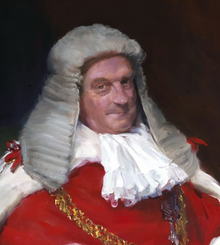The Lord Lane | |
|---|---|
 Lane in 1982, painted by George JD Bruce | |
| Lord Chief Justice of England | |
| In office 15 April 1980 – 27 April 1992 | |
| Preceded by | The Lord Widgery |
| Succeeded by | The Lord Taylor of Gosforth |
| Lord of Appeal in Ordinary | |
| In office 1979–1980 | |
| Lord Justice of Appeal | |
| In office 1974–1979 | |
| Preceded by | Sir Arthian Davies |
| Succeeded by | Sir John Donaldson |
| Justice of the High Court | |
| In office 1969–1974 | |
| Personal details | |
| Born | Geoffrey Dawson Lane July 17, 1918 Derby |
| Died | August 22, 2005 (aged 87) |
| Resting place | St Ippolyts, Hertfordshire |
| Nationality | British |
| Education | Shrewsbury School |
| Alma mater | Trinity College, Cambridge |
| Military service | |
| Allegiance | United Kingdom |
| Branch/service | Royal Air Force |
| Rank | Squadron Leader |
| Battles/wars | |
| Awards | Air Force Cross |
Geoffrey Dawson Lane, Baron Lane, AFC, PC (17 July 1918 – 22 August 2005) was a British barrister and judge who served as Lord Chief Justice of England from 1980 to 1992, having previously served as a Lord of Appeal in Ordinary from 1977 until 1980.
The son of a bank manager, Lane was educated at Shrewsbury School and Trinity College, Cambridge. During the Second World War, he served as a pilot in the Royal Air Force, for which he received the Air Force Cross. Called to the English bar in 1946, he practiced with great success, prosecuted in several high-profile criminal cases, and took silk in 1962. He was appointed to the High Court in 1969, sitting in the Queen's Bench Division, was promoted to the Court of Appeal in 1974 and to the House of Lords in 1977. The next year, after only six months in office, he was appointed Lord Chief Justice of England, serving until his retirement in 1992. A private man, Lane never gave interviews and kept a low public profile until his death in 2005.
The later part of his term was marred by a succession of disputed convictions, though Lane remained highly regarded by his colleagues and the legal profession. Lane's critics claimed that his refusal to believe that police evidence could be institutionally corrupt, and his reluctance to overturn the verdict of a jury, "represented a dangerous hindrance to justice".[1] His failure to allow the appeal of the Birmingham Six in 1988 led to calls for his resignation following their successful appeal in 1991; an editorial in The Times "urged him to go", while 140 members of parliament signed a House of Commons motion to that effect. On his death, the barrister Sir Louis Blom-Cooper declared that "by common consent of the legal profession, Lane was a very great Lord Chief Justice of England and Wales".[2]
- ^ Cite error: The named reference
obituarywas invoked but never defined (see the help page). - ^ Blom-Cooper, Louis (23 August 2005). "Lord Lane of St Ippollitts". The Guardian.